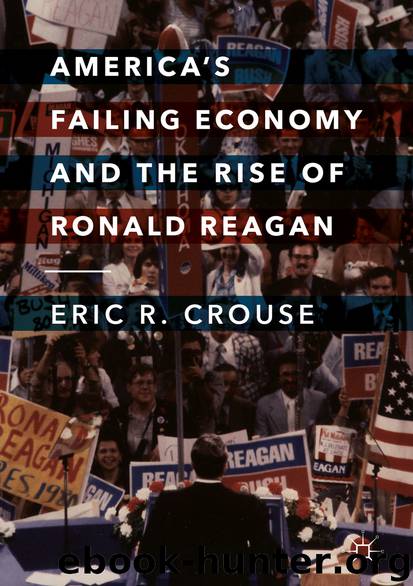America's Failing Economy and the Rise of Ronald Reagan by Eric R. Crouse

Author:Eric R. Crouse
Language: eng
Format: epub
Publisher: Springer International Publishing, Cham
III
Free-market economists had much to say about Carter’s first year. Former Secretary of the Treasury William E. Simon lamented that a “political-social-intellectual elite” promoted the government’s ability to control the “complex marketplace by fiat better than the people can by individual choice.”94 Simon’s analysis represented standard classical economics, but liberals were effective in portraying him as an extremist. More influential was Milton Friedman, who gave a good account of the shortcomings of Keynesianism. In his Newsweek column, Friedman cautioned the forthcoming Carter government to be wary of Keynesian exuberance.
The recent history of Great Britain, Italy, and other nations showed the “folly” of attempting to “spend your way out of a recession.” Any short-term gains from Keynesian actions came at the expense of future disastrous inflation. It was far better for the government to limit its spending; tighten the money supply; and, thus, allow the recovery to proceed at a moderate pace.95 In early January 1977, Friedman again advocated a “steady as you go” policy that avoided “fine-tuning policies to every wiggle in the economic indicators.” The economy was too complex for anyone—especially Keynesians —to manipulate to get the desired results.96
In contrast to the progressive wing of the Democratic Party, Friedman saw no evidence of economic conservatism in Carter’s proposals. In April, he revealed the real numbers behind the president’s proposal to lower taxes for business. The offer for businesses was an investment credit or an employment credit; both would complicate the tax system. The former was an example of “advanced tax gimmickry” and the latter reduced the taxes for some employers from 5.85 percent to 5.62 percent. Behind the smoke and mirrors, the only new jobs Carter’s proposals would guarantee were the bureaucrats needed to administer the misguided tax system. With Democrats controlling both the House and the Senate, Friedman was not hopeful.
Even though the House rejected Carter’s scheme, the tax credit bill it passed was no less gimmicky. The Senate Committee on Finance took the House bill and made it worse. As Friedman concluded, a better approach to stimulate the economy was simpler: “We do not need more tax gimmickry and more bureaucrats. We need lower government spending, lower taxes and fewer bureaucrats.”97 Friedman’s analysis came when Carter stood on solid political ground; in late April, a Gallup survey and Harris Poll had public approval for the president above 70 percent.
Another point of attack by Friedman concerned free trade. In July, he discussed why the Carter government was wrong to negotiate “voluntary” quota agreements with foreign producers. Free trade was a better approach for America than the political tactic of setting import quotas on Japanese television sets or South Korean shoes. Protecting specific domestic industries by “arm-twisting” agreements with other countries ultimately would mean higher prices for U.S. consumers. Besides, the argument that restrictive policies protected American jobs was misleading. For example, while there likely would be fewer jobs in the U.S. television-manufacturing industry if the Japanese sold less expensive televisions, there would be “more jobs in those industries that [could] … now export more to Japan.
Download
This site does not store any files on its server. We only index and link to content provided by other sites. Please contact the content providers to delete copyright contents if any and email us, we'll remove relevant links or contents immediately.
Pale Blue Dot by Carl Sagan(4984)
The Rules Do Not Apply by Ariel Levy(4943)
Goodbye Paradise(3790)
Ogilvy on Advertising by David Ogilvy(3584)
Liar's Poker by Michael Lewis(3433)
Delivering Happiness by Tony Hsieh(3408)
Into Thin Air by Jon Krakauer(3369)
Purple Cow by Seth Godin(3178)
Rogue Trader by Leeson Nick(3032)
The Social Psychology of Inequality by Unknown(3009)
The Airbnb Story by Leigh Gallagher(2834)
4 - Harry Potter and the Goblet of Fire by J.K. Rowling(2692)
The Mind Map Book by Tony Buzan(2562)
Bossypants by Tina Fey(2513)
Claridge's: The Cookbook by Nail Martyn & Erickson Meredith(2391)
All the President's Men by Carl Bernstein & Bob Woodward(2357)
Six Billion Shoppers by Porter Erisman(2287)
Master of the Game by Sidney Sheldon(2274)
Alibaba by Duncan Clark(2070)
